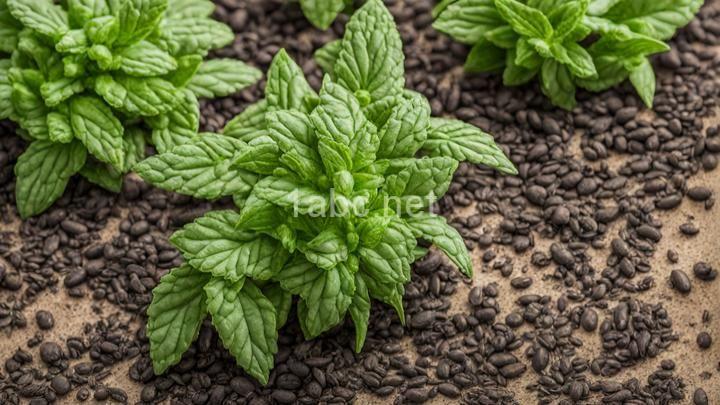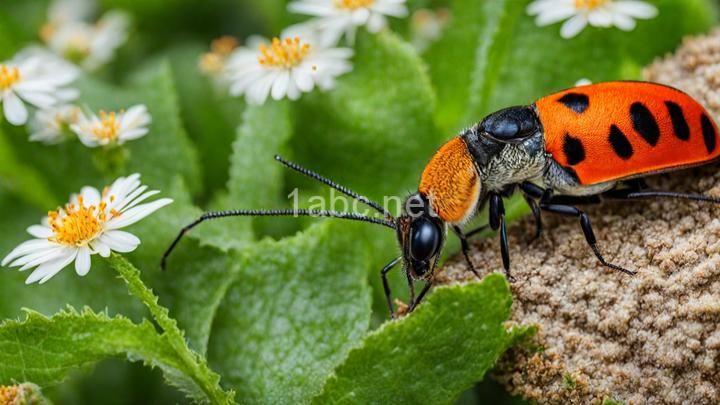Pest-Resistant Herbs: Adding Flavor and Functionality to Your Garden

Introduction:
Welcome, fellow garden enthusiasts, to this blog post! Today, we are going to explore the world of pest-resistant herbs and how they can bring both flavor and functionality to your garden. As a passionate gardener myself, I am thrilled to share with you the benefits of growing these remarkable herbs. Not only will they enhance your culinary creations, but they will also reduce the need for harmful pesticides and attract beneficial insects that naturally control pests. So let's dive in and discover the wonders of pest-resistant herbs together!
I. Understanding Pest-Resistant Herbs
A. Definition and Importance
Pest-resistant herbs, as the name suggests, are herbs that possess natural properties that repel or deter pests. They have evolved over time to develop defense mechanisms against common garden pests, making them invaluable additions to any garden. By incorporating these herbs into your garden, you can create a more balanced and harmonious ecosystem that thrives with minimal intervention.
B. Benefits of Pest Resistance
One of the primary advantages of growing pest-resistant herbs is the reduced reliance on pesticides. These chemicals can have detrimental effects on the environment, beneficial insects, and even our health. By choosing herbs that naturally repel pests, we can minimize the use of these harmful substances while still enjoying a flourishing garden. Additionally, pest-resistant herbs often emit fragrances that attract beneficial insects like ladybugs and lacewings, which prey on garden pests. This natural pest control mechanism saves us time and effort while contributing to the overall health of our gardens.
II. Popular Pest-Resistant Herbs
A. Basil
Basil, a staple herb in many cuisines, is not only easy to grow but also possesses natural repellent properties against certain pests. Its strong aroma acts as a deterrent for insects like mosquitoes, flies, and aphids. To grow basil in your garden, choose a sunny spot with well-draining soil and water consistently to keep the soil moist. Regular pruning will encourage bushier growth and ensure a continuous supply of fresh leaves for your culinary endeavors.
B. Mint
Mint, with its refreshing aroma and vibrant appearance, is an excellent addition to any garden. It is known for its effectiveness in repelling pests such as ants, fleas, and rodents. With a wide range of varieties available, including spearmint, peppermint, and chocolate mint, you can find a mint that suits your taste and climate. Mint thrives in moist soil and partial shade, making it an ideal herb for those with damp or shaded garden areas.
C. Rosemary
Rosemary, with its distinct pine-like fragrance and sturdy nature, is a champion when it comes to pest resistance. It is resilient against common garden pests such as aphids, cabbage loopers, and carrot flies. Not only can rosemary protect itself, but it also acts as a companion plant, deterring pests from neighboring vegetables and fruits. To cultivate rosemary successfully, choose a sunny location with well-draining soil and water sparingly to prevent root rot.
III. Tips for Growing Pest-Resistant Herbs
A. Choosing Suitable Varieties
When selecting pest-resistant herbs, opt for varieties known for their natural defense mechanisms against pests. Research specific cultivars that thrive in your region or climate zone, as different herbs have varying preferences for sunlight, temperature, and soil conditions. By choosing the right varieties, you are setting yourself up for success in creating a pest-resistant garden.
B. Proper Planting Techniques
To ensure healthy growth, it is essential to provide your pest-resistant herbs with adequate sunlight, suitable soil conditions, and proper drainage. Most herbs thrive in well-draining soil, so incorporate organic matter such as compost to improve the soil structure and fertility. When planting, follow the recommended spacing and depth for each herb, as overcrowding can lead to increased humidity and pest infestations.
C. Maintenance and Care
Like any other plants in your garden, pest-resistant herbs require regular maintenance and care. Water your herbs consistently, ensuring the soil is moist but not waterlogged. Prune regularly to promote bushier growth and prevent overcrowding, which can attract pests. Additionally, be vigilant for signs of common herb diseases and pests, such as powdery mildew or spider mites, and take appropriate measures to mitigate their impact.
IV. Incorporating Pest-Resistant Herbs in the Garden
A. Companion Planting
Companion planting, the practice of growing different plants together for mutual benefit, can significantly enhance your pest control efforts. By strategically pairing pest-resistant herbs with vegetables or other plants, you can create a harmonious ecosystem that deters pests naturally. For example, planting basil near tomatoes can repel hornworms, while rosemary can protect cabbage from cabbage loopers. Experiment with different combinations and observe the positive impact on your garden's overall health.
B. Culinary Uses and Recipes
The beauty of pest-resistant herbs lies not only in their ability to ward off pests but also in their culinary versatility. Basil, mint, and rosemary are staples in the kitchen, adding incredible flavor and aroma to a wide range of dishes. From pesto pasta to mint-infused lemonade, the possibilities are endless. To get you started, here are two simple and delicious recipes:
- Caprese Salad with Basil: In a bowl, combine fresh basil leaves, sliced tomatoes, mozzarella cheese, and a drizzle of olive oil. Season with salt and pepper to taste. Serve as a refreshing appetizer or side dish.
- Minty Watermelon Salad: In a large bowl, combine diced watermelon, chopped mint leaves, crumbled feta cheese, and a squeeze of lime juice. Toss gently and refrigerate for an hour before serving. This salad is a perfect balance of sweetness and freshness, ideal for hot summer days.
Conclusion:
In conclusion, growing pest-resistant herbs in your garden not only adds flavor and functionality but also promotes a healthier and more sustainable approach to gardening. By understanding the definition and importance of pest-resistant herbs, exploring popular varieties like basil, mint, and rosemary, and following tips for growing and incorporating them into your garden, you can create a thriving ecosystem that reduces the need for harmful pesticides. So, why not embark on this rewarding journey of growing pest-resistant herbs? Your taste buds, garden, and the environment will thank you for it. Thank you for joining me on this herbal adventure, and I encourage you to share your own experiences or ask any questions in the comments below. Happy gardening!
FREQUENTLY ASKED QUESTIONS
What are pest-resistant herbs?
Pest-resistant herbs are herbs that have a natural ability to deter or repel pests. These herbs contain certain compounds, such as essential oils, that interfere with the sensory receptors of insects and other pests, making them less likely to attack or infest the plants. By growing pest-resistant herbs, you can reduce the need for pesticides and ensure a healthier and more sustainable garden. Some commonly known pest-resistant herbs include mint, lavender, rosemary, basil, and thyme.
Why should I consider growing pest-resistant herbs in my garden?
Growing pest-resistant herbs in your garden offers several benefits:
- Reduced pesticide usage: Pest-resistant herbs naturally deter pests, reducing the need for chemical pesticides in your garden. This helps minimize the environmental impact and potential health risks associated with pesticide use.
- Lower maintenance: Pest-resistant herbs are less prone to pest attacks, which means less effort and time spent on pest control. This can make gardening more enjoyable and convenient.
- Increased productivity: By growing pest-resistant herbs, you can expect better plant health and increased yield. These herbs are more likely to thrive and produce abundant harvests, giving you a bountiful supply of fresh herbs for cooking or medicinal purposes.
- Natural pest control: Some pest-resistant herbs also act as natural repellents or companions to other plants. For instance, planting basil near tomatoes can deter pests that commonly attack tomato plants. This reduces the risk of pests damaging your other garden crops.
- Diverse culinary options: Pest-resistant herbs come in a wide variety, allowing you to experiment with different flavors and culinary options. You can grow a range of aromatic herbs like thyme, rosemary, and oregano, which not only repel pests but also add delicious flavors to your meals.
Overall, growing pest-resistant herbs adds convenience, sustainability, and flavor to your gardening experience while minimizing the need for pesticides.
Which pest-resistant herbs are suitable for my garden?
There are several pest-resistant herbs that are well-suited for a garden. Here are some popular options:
- Mint: Mint is known for its strong aroma, which repels a wide range of pests such as mosquitoes, flies, and ants.
- Rosemary: Rosemary has a strong fragrance that deters pests like mosquitoes, cabbage moths, and carrot flies.
- Lavender: Lavender emits a calming scent that repels mosquitoes, fleas, and moths. It also attracts pollinators like bees and butterflies.
- Basil: Basil has natural repellent properties that can keep away flies, mosquitoes, and aphids.
- Thyme: Thyme contains thymol, which is a natural insect repellent. It can deter pests like cabbage worms, onion flies, and mosquitoes.
- Chives: Chives act as a natural deterrent against pests like aphids, carrot flies, and Japanese beetles.
- Dill: Dill attracts beneficial insects like wasps and ladybugs, which prey on garden pests like aphids and caterpillars.
- Sage: Sage has a strong scent that repels many pests, including cabbage moths, carrot flies, and slugs.
These herbs not only offer pest-resistant benefits but also add flavor and aroma to your culinary dishes.
How do pest-resistant herbs help in pest control?
Pest-resistant herbs can help in pest control in several ways:
- Natural repellent: Some herbs have inherent properties that repel pests. The strong fragrance and volatile compounds produced by these herbs act as a natural deterrent for many pests.
- Companion planting: Planting pest-resistant herbs alongside other plants can help repel pests and protect the neighboring crops. For example, planting basil next to tomatoes can help deter pests like aphids and whiteflies.
- Attracting beneficial insects: Certain pest-resistant herbs, such as dill, fennel, and cilantro, attract beneficial insects like ladybugs, lacewings, and parasitic wasps. These insects prey on pests and effectively control their populations.
- Allelopathic effects: Some pest-resistant herbs release chemicals into the soil that can inhibit the growth of pests or disrupt their life cycles. This natural process is called allelopathy and can help reduce pest populations.
- Essential oils: Many pest-resistant herbs contain essential oils that possess insecticidal properties. These oils can be extracted and used in natural pest control solutions, such as homemade insect sprays.
By incorporating pest-resistant herbs into your garden or growing them near susceptible plants, you can create a more pest-resistant environment and reduce the need for chemical pesticides.
